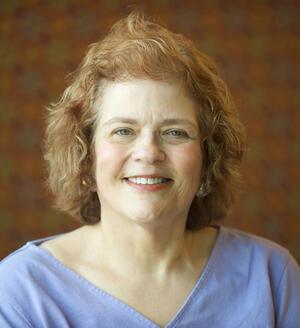Lynn Gordon
Lynn Gordon, pioneer scholar in women’s history, adamant advocate for women in the academy and in the history profession more specifically, would be pleased to be remembered not just as a dedicated scholar and teacher but as a passionate believer in family, friends, community, “sisterhood,” and the Jewish people. As someone who cared deeply about the world around her, she read everything, attended every possible lecture she could get to. No matter how ill she was, no matter how exhausted she was from her seemingly endless battery of treatments, she could be counted on to learn more, expand her thinking, and yes, challenge with penetrating questions. Lynn exuded love for critical learning, broad humane social policy, and at the personal level, for her wonderful partner-in-life Harold, her two children Sam and Abby.
Lynn grew up in Chicago, a city she always loved, in a large extended family, one in which aunts, uncles, and cousins were deeply involved with each other. She attended Barnard, an all-women’s school which influenced her thinking about women’s education, and then got her doctorate at the University of Chicago. She taught at Bowdoin College and Princeton before joining the University of Rochester faculty in 1983.
The author of the landmark book, Gender and Education in the Progressive Era, she spent over a decade working on a biography of Dorothy Thompson. Thompson intrigued Lynn as a professional woman who entered into the male domain of journalism, particularly as a foreign correspondent. Lynn wanted to analyze what made this woman willing, able, and eager to behave in what clearly had been a deviant manner, given the standards of her time, by defying convention and doing what few other women had. By working on this book, Lynn immersed herself in the world of Holocaust scholarship since Thompson was one of the few American reporters who interviewed Hitler and who wrote extensively and presciently about the danger emanating from Berlin. By the late 1940s, Thompson had emerged as a vociferous critic of the creation of a Jewish state, moving Lynn to dip deeply into the literature of Zionism and Jewish nationalism.
This unwritten book represents a perfect melding of Lynn’s vision of herself and what mattered in as much as she believed deeply that the “personal is the political and the professional,” the title of a biographical article she wrote for Leaders in the Historical Study of American Education. The biggest tragedy is that Lynn is gone at such a tragically young age, and it is our loss, as women’s history scholars and scholars of Jewish history, that this book will never be completed.
Lynn so wanted to finish that book. She felt tremendous frustration that her long years of ill-health left her too weak to accomplish what she had set out to do. But even when sick, or between bouts of sickness, she never dropped her engagement with her students, her university, and she tried heroically to keep her research and writing on track. Alas, the track was too long.
She had an enormous circle of friends, some going back to college and others acquired along the way every place she went. She learned from everybody, and her capacity for friendship was so great that adding more friends did not diminish the attention and care she gave to those she already included in her circle. People flocked to Lynn as did her students at Rochester about whom she cared deeply. As befits a scholar of the history of higher education, she considered teaching her calling. Since her death, the students she taught and who occupied an important part of her concern have testified to her inspirational mentorship.
She believed deeply in the enduring importance of feminism, a political force which transformed the world but one Lynn believed had much more to accomplish. She was a deep believer in social justice and also in the centrality and needs of the State of Israel. She and I disagreed about the latter, but a conversation with her left me with a sense that I had to find better ways to justify my positions; she was so well-read, so thoughtful, and so articulate.
I have to add despite its deviation from tone of this piece that Lynn adored shoes. I made the mistake of asking her to go with me to buy a pair of shoes for my daughter’s wedding and let her talk me into a pair with wickedly spiked heels that consumed all my attention marching down the aisle and standing under the huppah. Actually this list of the non-professional and non-political which moved Lynn included her two dogs, and maybe all dogs, and, for lack of a better word, tchatchkes. Whether amassing a multitude of Beanie Babies or the most whimsical pieces of Judaica, some of which she gave me as gifts, she had an eye for the cute and the collectible. Finally as an avid reader, she devoured the Harry Potter books and so many other cult-serials.
Along with hundreds of others, I miss her deeply. More importantly, the world of women’s history scholarship will miss her voice, one that never got to soar as high as it should have.



